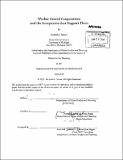Worker owned cooperatives and the ecosystems that support them
Author(s)
Tanner, Rachael A. (Rachael Ann)
DownloadFull printable version (10.40Mb)
Other Contributors
Massachusetts Institute of Technology. Department of Urban Studies and Planning.
Advisor
Xavier de Souza Briggs.
Terms of use
Metadata
Show full item recordAbstract
By emphasizing wealth creation, communities can not only cultivate streams of income, but also build wealth. Through collectively owned and democratically governed assets, communities can build wealth. Economic development policy and practice should emphasize wealth creation. Employee ownership, through worker cooperatives is one way to build wealth. But worker cooperatives are rare in the United States; this is because there is not a supportive cooperative ecosystem. The province of Quebec, Canada has developed a robust cooperative ecosystem, leading the province to have the most cooperatives in Canada and a greater density of worker co-ops than the US. This thesis explores the Quebec cooperative ecosystem through analysis of interviews with 22 leaders of over 19 organizations, including two worker cooperatives. This thesis seeks to understand (1) how the organizations and institutions in the ecosystem work together, (2) how they support cooperatives, and (3) how the lessons from Quebec can inform the development of a cooperative ecosystem in New York City. This study reveals (1) the importance of historical, political, and cultural context in shaping the potential and possibilities for cooperative development; (2) that government support through policy, funding, and collaborative leadership is critical for the ecosystem's development; (3) apex organizations are necessary to provide leadership and technical assistance among cooperatives; (4) interaction among cooperatives of all kinds leads to a stronger network; and (5) the size of the sector makes it easier to secure public support.
Description
Thesis (M.C.P.)--Massachusetts Institute of Technology, Dept. of Urban Studies and Planning, 2013. Cataloged from PDF version of thesis. Includes bibliographical references (p. 129-134).
Date issued
2013Department
Massachusetts Institute of Technology. Department of Urban Studies and PlanningPublisher
Massachusetts Institute of Technology
Keywords
Urban Studies and Planning.